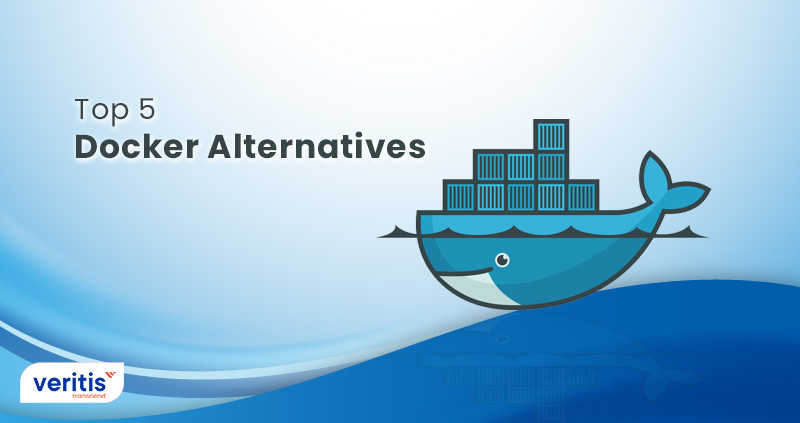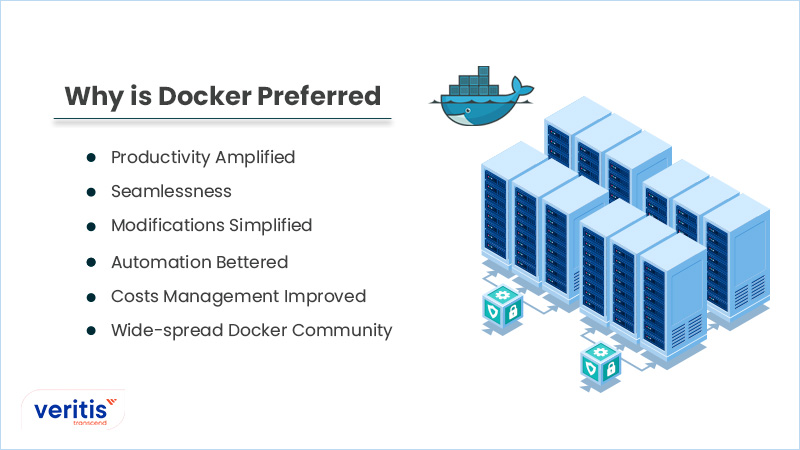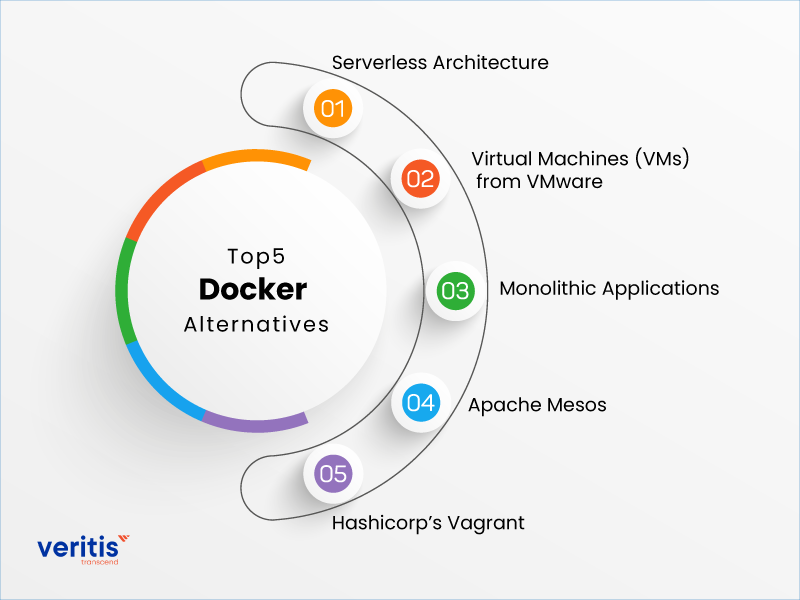
Containerization has reinvented the working style as it is easier to deploy and manage. Docker has popularized them to the extent that it has become synonymous with the container. While all Dockers are containers, vice versa is not valid. But what is the buzz surrounding Docker, and what are the other alternatives one can go for if Docker isn’t their first choice?
Overview of Docker
Like its sibling Kubernetes, Docker is an open-source DevOps tool favored highly among IT people. It was initially compatible with Linux alone, but now Docker is highly compatible with Windows and macOS. The Docker technology allows developers to create applications with OS, run-time tools, and other dependencies. Despite being packed to the hilt with features, the dockers are easy to maintain, and they can be deployed automatically on the chosen infrastructure.
Cloud-native approach and multi-cloud strategies have only propelled the usage of Docker as they ease the operations, which span from building to maintenance, as Docker allows management through API and other command interfaces in various environments.
The open-source tool possesses an edge over the virtual machines as the former encapsulates the virtual resources in the OS kernel. At the same time, the latter is backward by encapsulating the entire OS. It also lets you execute numerous containers using the same infrastructure.
Understanding Docker
Docker’s capabilities are centered on the Docker Engine. This is one of the most crucial components of the Docker application as it installs a server-side daemon, a repository that houses containers and other crucial data. The Docker also creates a client-side CLI, facilitating server communications through APIs’. Developers refer to Docker containers as Dockerfiles.
Useful Link: Top 10 DevOps Tools to Pick for Your Business
Why is Docker Preferred

Docker is preferred for various reasons. However, as the blog is about Docker, we shall highlight only Docker’s biggest benefits.
• Productivity Amplified
Dockerfiles build bricks for CI/CD DevOps pipelines as containers are quickly built and deployed. They outclass virtual machines on this front and gel well with the cloud-native architecture. The compatibility with DevOps and cloud-native architecture lends the edge to developers to build robust packages excited about the quality.
• Seamlessness
While initially intended for Linux, Dockerfiles no longer resemble a typical Linux container as they are highly footloose. They are compatible with any platform and machine and gel well with any OS, and due to these aspects, Docker containers are incredibly seamless when it comes to movement and deployment across any installation.
• Modifications Simplified
Every Dockerfile comes with a process that allows developers to make it lightweight. This process allows developers to modify an application without taking it down to execute the changes. In other words, the DevOps CI/CD pipeline members can effectively update the app at a granular level.
• Automation Bettered
Automation is one of the critical aspects of the digital world of today. Companies worldwide are implementing this to reduce human error and deploy updates better. There are various uses for automation, but the cloud has revolutionized it, and Docker complemented the cloud’s ambitious automation plans with docker files. A docker can create a container with your application source code alone. Furthermore, it allows the creation of containers using the existing content as a foundation image template. You can also roll back easily as Docker also has a versioning system.
• Costs Management Improved
Money is one of the key aspects that decide any technology procurement. Most current IT technologies have taken cognizance of the significance of cost factors and have implemented pay-as-you-go models across their technological offerings. Cloud computing has made this pay-as-you-go model popular, which allows users to pay only for the resources and trim their capital expenditures.
Docker embraced the same spirit by allowing its users to ramp up production with a minimal spike in production. First, Docker is free to use as it is open-source. That wicks away unwanted licensing headaches, and its fluidic nature allows it to be used on any infrastructure.
Additionally, productivity is enhanced by running more code on each server. Finally, the accompanying benefits, such as automation, allow you to save expenses spent on manpower, further reducing costs. In a nutshell, Docker ensures cost savings without hampering product quality.
• Wide-spread Docker Community
It is no secret that open-source projects are prevalent among IT developers. Linux, which was developed as an open-source OS, has become one of the most widely used OSs worldwide. The same is the case with UNIX and Kubernetes. They are all kept alive by the growing contributions of developers. The contributions keep the application relevant, and open-source contributions encourage a widespread network of users to exist.
In addition, developers participate in discussions that propagate and pave the way for change, whether on forums or any platform. The same is the case with Docker, as it is also open-source, and you can access the user-uploaded containers to get your job done, should it suit your requirements. This saves time and money.
Useful Link: 8 DevOps Adoption Challenges Businesses Must Overcome
Why Seek Docker Alternatives?

It may be stupefying why one would seek alternatives for Docker when there are so many benefits. After all, it is open-source, and it can be downloaded with no hassle. However, there is a substantial managerial populace looking for Docker alternatives for specific reasons. So, let’s understand them better.
Right off the bat, Docker is not easy for all. It takes a certain amount of time to understand the intricacies of Docker. Additionally, it puts up a daunting learning curve for novices. The open-source origins mean an overabundance of learning material out there, and Docker novices would have to wade through a lot of learning material to realize their business goals. This is one of the motivating reasons why companies seek the services of Veritis, as we have amassed enough expertise to tailor Docker and non-Docker solutions.
The open-source intricacy also means that everything is not readily available. This throws up various issues that the administrators have to deal with. For example, for requirements that Docker does not meet, one would have to seek and integrate third-party tools to achieve what is wished. Also, one would have to store the data in another repository, as persistent data storage is not an option with Docker.
Also, the expertise is back in the picture as it requires skills to configure and implement container orchestration. This aspect extends to orchestration tools ranging from Docker Swarm to Apache Mesos. Although this blog is about Docker, the same applies to Kubernetes orchestration, as it requires a lot of skill sets.
Finally, docker files demand your energies to secure the layers, which are relatively more when pitted against a regular stack. These factors bog down the docker adoption as training your in-house DevOps team on docker technology would be expensive and too complex without indulging in the learning courses. The net result would defeat the purpose of Docker. So, while the benefits of Docker are certainly enticing, the cons are reasons enough to motivate managers to seek Docker alternatives.
In the next section, we shall explore the docker alternatives. First, however, it would help to understand that each has advantages and drawbacks. So, it’s best to understand them properly before embracing one of the alternatives. But you should know that you are missing out on an opportunity by skipping docker technology, and if you have a chance, take your time and experience the benefits.
So, now, let’s dive into the next section without further ado.
Useful Link: Top 6 DevOps Trends in 2022 and Beyond
Alternative 1: Serverless Architecture
Serverless architecture is gaining momentum as its benefits attract many organizations to adopt it instead of Docker. While serverless gives an impression that no server is involved, serverless infrastructure implies no requirement or need to manage and maintain a server to execute an application.
The cloud vendor eliminates the server’s maintenance requirement as he maintains it. With these aspects out of the picture, the DevOps team can concentrate on other aspects that demand their attention. As a result, the developers can work better with serverless architecture by easily deploying their applications, be it coding or packaging. In addition, organizations can opt for what backend services are required and deploy their solutions on the maintained servers.
As we understand, serverless removal removes the problems and burgeoning aspects of maintenance by offloading all of those aspects to the cloud vendor. There is no learning curve here and no docker or container configuration intricacies. The additional benefits involve the organization not concerning itself with scalability issues and upgrading or updating deployment as they are delivered faster and better to the market.
Alternative 2: Virtual Machines (VMs) from VMware
While it is a train of thought that VMWare will lose its relevance, it is not anytime soon. VMware continues to lead the race in the virtualization arena, and it is a good alternative for docker technology. The difference between Docker and VMware is that Docker focuses on the resources at the OS level while the latter makes virtualization possible on the hardware level.
VMware also brings along the vSphere suite that houses various tools required to make cloud virtualization possible. In addition, the vSphere is strong-armed by ESXi, allowing developers to run multiple operating systems on one host. Effectively, every OS gets to run with its dedicated resources.
Alternative 3: Monolithic applications
Monolithic applications are another alternative to Docker, which employ AWS, Azure, or GCP virtual machines. Should you choose AWS, an AWS EC2 instance, you will get the basic OS components and other essentialities that you would need to get things going. Also, you can use AMI or Amazon Machine Image to create your unique VM in the same instance.
This AMI can be utilized for specific cases, and this would be enabled by developers who configure the AMI when they are running it in AWS. One can also use Amazon ECS for orchestration purposes. However, AMIs are not lightweight compared to dockers, which can be made lightweight.
Alternative 4: Apache Mesos
Apache is well-known among the IT community as it is popular for its open-source products. Apace Mesos is the same as it is an open-source container tool. It was developed by Apache Software Foundation and was formerly called Nexus. Coded with C++ language. The abstraction tool differentiates virtual resources from hardware and gives you the capabilities to run apps on it. You can also execute Kubernetes, Hadoop, and other such tools on Mesos.
Alternative 5: Hashicorp’s Vagrant
Hashicorp has made Vagrant open-source, and organizations have built and managed software deployment. It sports an intuitive workflow and facilitates automation. Vagrant users can automatically create mobile development ecosystems. You should adopt Vagrant if you are inclined to a compatible and easily usable software when you are not entirely reliant on microservices for your business.
Conclusion
Docker is a great tool, and so are the others listed here. However, every tool sports a small to the steep learning curve, which would set back every organization on time and other resources. So instead, you can rope in Stevie Award recipient Veritis to ease your docker woes and realize the benefits of boosting your productivity. So, contact us and explore the best.
Explore Devops Solutions In Need of Support
Additional Resources: